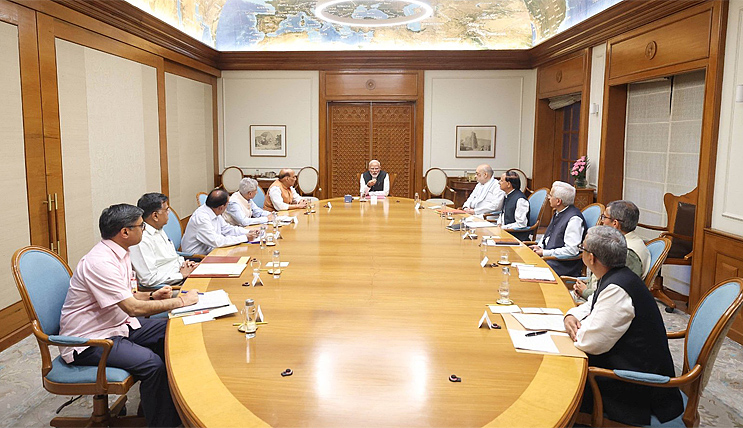INDIAN ARMED FORCES CHIEFS ON OUR RELENTLESS AND FOCUSED PUBLISHING EFFORTS

The insightful articles, inspiring narrations and analytical perspectives presented by the Editorial Team, establish an alluring connect with the reader. My compliments and best wishes to SP Guide Publications.

"Over the past 60 years, the growth of SP Guide Publications has mirrored the rising stature of Indian Navy. Its well-researched and informative magazines on Defence and Aerospace sector have served to shape an educated opinion of our military personnel, policy makers and the public alike. I wish SP's Publication team continued success, fair winds and following seas in all future endeavour!"

Since, its inception in 1964, SP Guide Publications has consistently demonstrated commitment to high-quality journalism in the aerospace and defence sectors, earning a well-deserved reputation as Asia's largest media house in this domain. I wish SP Guide Publications continued success in its pursuit of excellence.
- Prime Minister Modi Visits Punjab’s Adampur Air Base, Interacts with Airmen after Successful ‘Operation Sindoor’; Stern Message to Pakistan
- The layered Air Defence systems that worked superbly, the key element of Operation Sindoor
- Operation Sindoor | Day 2 DGMOs Briefing
- Operation Sindoor: Resolute yet Restrained
- India's Operation Sindoor Sends a Clear Message to Terror and the World – ‘ZERO TOLERANCE’
- Japan and India set forth a defence cooperation consultancy framework, talks on tank and jet engines
Terrorist Attack in Pahalgam in Kashmir: Unfolding a long surgical war against PAK
India would pursue those responsible “to the end of the earth”. “Blood and water cannot flow together,” Prime Minister Modi responds to the heinous terror attack on the innocent civilians and tourists in Pahalgam in J&K. While military is already on high alert, the talk of a long surgical war, aimed to dismantle the terrorist outfits, is growing louder while the massive international condemnation continues pouring in.

On April 22, 2025, a devastating terrorist attack in Pahalgam, Jammu and Kashmir, claimed the lives of at least 28 individuals, mainly tourists, marking one of the deadliest civilian massacres in India since the 2008 Mumbai attacks. The massacre of innocent civilians, most of them tourists, by Islamist terrorists has shaken the conscience of the nation and the world. The Pahalgam attack is a stark reminder of the heinous act of terrorism which is constantly instigated and perpetrated by Islamist terrorists, hiding under the patronage of the Pakistani government and military wings –ISI.
The Attack and Its Aftermath
The assault occurred in the picturesque Baisaran Valley, a popular tourist destination, where gunmen opened fire on a group of visitors, resulting in widespread panic and chaos.
The perpetrators, identified as members of The Resistance Front (TRF), an offshoot of the Pakistan-based Lashkar-e-Taiba (LeT), targeted civilians in an apparent attempt to disrupt the region's fragile peace and to oppose demographic changes in the Kashmir Valley. The attackers were reported to have used M4 carbines and AK-47 rifles, firing approximately 70 rounds during the assault.
The massacre of innocent civilians, most of them tourists, by Islamist terrorists has shaken the conscience of the nation and the world
India summoned Pakistan's top diplomat, accusing Pakistan of supporting cross-border terrorism. The government announced several punitive measures, including the suspension of the Indus Waters Treaty, the closure of the Attari–Wagah border, the expulsion of Pakistani military advisers from the Indian High Commission in New Delhi, and the withdrawal of Indian diplomats from Islamabad.
Prime Minister's Response
Prime Minister Narendra Modi condemned the attack as a heinous act of terrorism and vowed to bring the perpetrators to justice. In a statement, he declared that India would pursue those responsible "to the end of the earth". He also emphasised that "blood and water cannot flow together," reiterating India's stance on the Indus Waters Treaty.
Addressing a public rally in Bihar's Madhubani district on Thursday, Prime Minister Narendra Modi emphatically said that those responsible for the "terrorist attack and their conspirators will be punished beyond their imagination. "They will be punished", he reiterated.
India would pursue those responsible 'to the end of the earth,'" declared Prime Minister Narendra Modi, vowing a relentless campaign against the perpetrators
The Indus Waters Treaty governs the use of waters from the Indus River and its tributaries between India and Pakistan. According to the treaty, which was signed in 1960, India controls the waters of the eastern rivers (Beas, Ravi, and Sutlej), while Pakistan controls the western rivers (Indus, Chenab, and Jhelum). The treaty has been a cornerstone of bilateral relations, but tensions have escalated over its implementation, particularly following incidents of cross-border terrorism.
Diplomatic and Military Implications
Total economic and trade disengagement with Pakistan is already unfolding, with such critical announcements as the suspension of the Indus Waters Treaty representing a significant escalation in India's diplomatic and military posture towards Pakistan. By halting the flow of water to Pakistan, India aims to exert pressure on Islamabad to cease its support for terrorist activities in Kashmir. The closure of the Attari–Wagah border and the expulsion of Pakistani diplomats further strain bilateral relations, potentially leading to a broader regional conflict.
Blood and water cannot flow together," Modi said, reiterating India's hardened stance on the Indus Waters Treaty in response to acts of terrorism
Colonel Prashant Jha (Retd), Former commander at the Air Defence regiment, Indian Army, who has served in J&K, has laid out the possible military applications to neutralise the terrorist operating base under the tutelage of the Pakistani government.
With a situation like this, there are possibilities of extreme deployment as Prashant points out, "revert to Kargil war type defensive deployment including artillery, surveillance and ground special forces aimed at the achievement of complete insulation of the Line of control and right down till the last land borders in Gujarat."
With high alert issues, "IAF would now mobilise across the airfields along the western border while the Navy would now increase its anti-infiltration and security of its SLOCs (Sea lines of Communications) by all possible stand-off means," he added.
By halting the flow of water to Pakistan, India aims to exert pressure on Islamabad to cease its support for terrorist activities in Kashmir
There is already a breakdown of the ceasefire. Is there a possibility of further surgical strikes, aimed at neutralising the terrorists' operational haven by covert trans-border raids by Land forces, which took place in the past? "Expect at least 2 to 3 raids at enemy launch pads per month for the next 8 months," Colonel Prashant exhorts.
The international community has expressed concern over the deteriorating situation. Leaders from various countries have condemned the terrorist attack. The risk of further escalation remains high, as India has vowed to retaliate and hunt down the terrorists, hiding in Pakistan under the protection of the government and ISI.
The Pahalgam terrorist attack has not only resulted in a tragic loss of life but has also brought India-Pakistan relations to a critical juncture. The suspension of the Indus Waters Treaty and the subsequent diplomatic measures signal India's determination to combat cross-border terrorism.
Manish Kumar Jha is a Consulting & Contributing Editor for SP's Aviation, SP's Land Forces and SP's Naval Forces and a security expert. He writes on national security, military technology, strategic affairs & policies.





